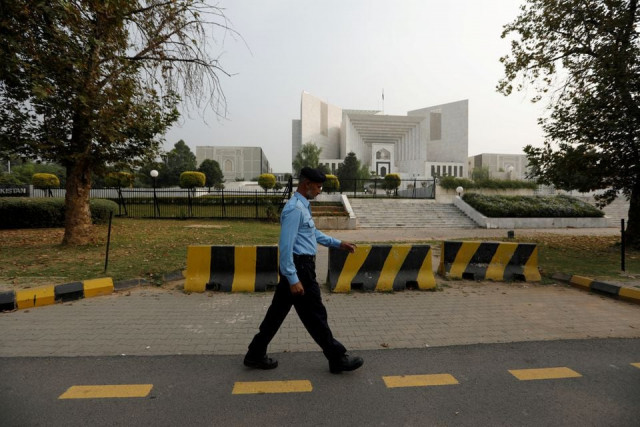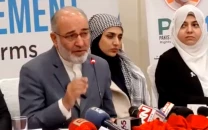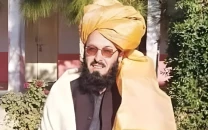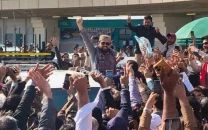Courts opened on April 9 late night on SCBA push
CJP Bandial discloses that several judges contacted him that day to share concerns about the constitutional situation

Despite the PTI supporters criticising the country’s top judge Umar Ata Bandial and Islamabad High Court Chief Justice Athar Minallah for opening their courts on Saturday night during the crisis of the opposition’s no-confidence motion against former premier Imran Khan -- some even alleging that the judiciary was active on account of the intervention of 'powerful circles' -- the fact is that throughout last month, Supreme Court Bar Association (SCBA) President Ahsan Bhoon remained in contact with the chief justice of Pakistan since March 15 for passing a restraining order against any extra-constitutional step.
CJP Bandial on March 19 took up the SCBA petition for ensuring the process of Article 95 of Constitution. The plea was taken up on Saturday, a day when benches usually do not hear cases.
Several directions were passed by the apex court in the case. Later, the matter was connected with the presidential reference seeking the scope and interpretation of the Constitution’s Article 63-A.
When the National Assembly deputy speaker through his ruling rejected the no-confidence motion against ex-PM Imran on April 3, SCBA President Bhoon contacted CJP Bandial for taking up the matter to avoid a situation which might allow authorities to take extra-constitutional steps.
The CJP had taken up the SCBA petition on April 3, even though it was a Sunday.
CJP Bandial disclosed in his order that several judges had contacted him that day to share their concerns about the constitutional situation following the rejection of the motion of no-confidence against the prime minister by the deputy speaker on the basis of Article 5.
The SC in its order on April 3 had held that no state functionaries or bodies shall take any extra-constitutional measures and act strictly in accordance with the Constitution and the law as guided by the principles laid down by this court in the case of the Sindh High Court Bar Association versus Federation of Pakistan.
Finally, the court on April 7 set aside the deputy speaker’s ruling and ordered the NA speaker to complete the process of no-confidence motion against the ex-PM on April 9 (Saturday).
When the NA speaker did not start the voting process until Saturday evening and there was growing unrest in the country, SCBA President Bhoon became active and approached both the SC and IHC to pass an appropriate order otherwise the country might face a military coup.
Following this situation, the CJP came to the SC while Chief Justice Minallah arrived at the IHC premises to pass an appropriate order to prevent the security establishment from taking any extra-constitutional step.
Read: Politicians remember Constitution when their interest is at stake: PSP
When TV channels reported that the courts were being opened, sense prevailed and NA Speaker Asad Qaiser and Deputy Speaker Qasim Suri tendered their resignations. Later, the voting process was started late at night.
However, PTI lawyers believe that there was cohesion among powerful institutions for ousting Imran.
On the other hand, superior bars are appreciating CJP Bandial’s role to save the Constitution in prevailing situation.
The IHC had issued a circular in 2019 wherein the contact numbers of four IHC officials were given.
Litigant can approach the IHC anytime for highly urgent matters, especially those related to right to life.
SCBA President Bhoon told The Express Tribune that the IHC was contacted through this process mentioned in the circular.
PTI lawyers themselves admit that their relationship has not remained cordial with the bar during the party’s tenure.
Independent lawyers say that the PTI government’s track record was “not good” in matters related to civil liberties and the bar had always raised its voice on such issues. Likewise, the PTI government also gave a tough time to media that played a key role in building a narrative against ex-PM Imran.



















COMMENTS
Comments are moderated and generally will be posted if they are on-topic and not abusive.
For more information, please see our Comments FAQ